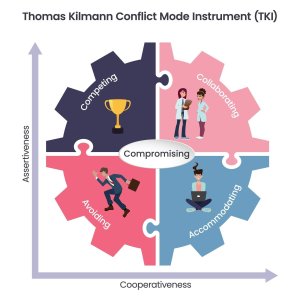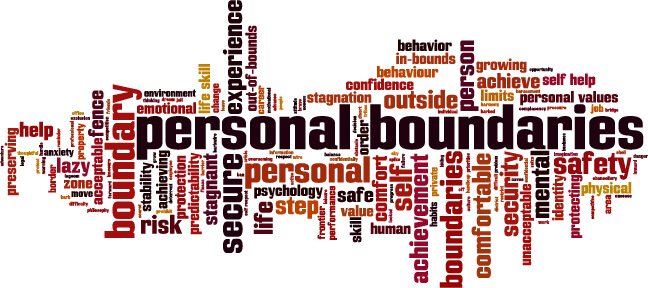Ask Joy: Conflict Resolution – From the workplace to interpersonal conflicts
- Replies 8
Note from the Editor:
This article was kindly written for the SDC by retired psychologist/ member @Joy Straw.
Conflict comes in all shapes and sizes. It can affect us at work, at home and in our personal relationships. How we go about resolving conflict is determined by the people involved, why there is a conflict and how it can be resolved.
WORKPLACE CONFLICT
Workplace conflicts are based around how much individuals want to work together, cooperate, and compromise. The more collaboration and accommodation will lead to compromise and resolution of a situation. This will result in a more harmonious workplace. More competition, avoidance and strong assertiveness will result in less collaboration but still may result in resolution. In a competitive workplace, there is a lot more tension, and therefore, there can be more conflict. This may be ideal in a competitive market but not suitable in collaborative situations.
INTERPERSONAL CONFLICT
In interpersonal relationships, many similar strategies may be used, but more personal approaches will result in better communication and reduced conflict.
It should be stressed that it is quite natural for conflict to arise, e.g. between mother and child, between husband and wife, with families and extended family.
Conflict can arise due to:
In trying to resolve conflict, it is important to define the issues. It is also important to define the boundaries in order to resolve an issue. There is very little use in ‘kitchen sinking’, i.e. everything gets thrown into the conflict, including the ‘kitchen sink’. ‘I remember when 20 years ago you said…’ and ‘It’s your fault the dishes weren’t done, and you forgot to take out the garbage bin and…’
Basic strategies
Skills to decrease conflict and enhance resolutions
Why it’s healthy to resolve conflicts
Resolving conflicts, before they become major issues, helps with:
Recognise when it’s time to take a break
While trying to resolve an issue, it may be necessary to stop, rethink and regroup. Don’t be afraid to speak up and ask to stop for a period of time.
Tension: You may notice you are tense, red face, raised voice, or feeling like throwing something.
Ask for a break: Ask ‘Can we take a break for half an hour and talk about things after that?’ Set a time and an agreement to return to the conversation. Don’t tell someone else to take a break. Just ask for one for yourself.
Relax and calm down: Take time to find calm breathing, take a shower or go for a walk.
Don’t lose sight of what the issue is: What feelings arose? Take a minute to reflect on your and your partner's respect for each other. Keep to ‘I’ statements.
Return to the conversation, not to the argument.
Breathe: Helps to de-escalate, and remember, when you raise your voice, they will too.
Point to remember: If you have intense feelings arising from the conflict at a quieter time, reflect back on whether the feelings had to do with the argument, the issue, or how you were interacting with the other person. It may be an unresolved issue unrelated to the other person.
After any conflict, reflect on how you handled the issue. Was there anything you would or could have done differently? What started the conflict and could it have been avoided? Please remember conflict is normal; how you handle it is what makes things feel better or worse. You cannot change somebody else’s behaviour or attitude; you can only change and control your own.
About the author: My name is Joy Straw, and I’ve been a counsellor and (now retired) psychologist working with couples and individuals, as well as children in crisis, for over 30 years. I am a widow with two children and three grandchildren and have recently moved to a retirement village and am loving life again.
Interested in reading more from Joy? You can find all her articles here.
Looking for immediate support? Here is a list of free mental health helplines.
You can ask Joy a question here.
Not a Rewards member yet? You can sign up for SDC Rewards today—it starts at under 14 cents per day.
This article was kindly written for the SDC by retired psychologist/ member @Joy Straw.
Conflict comes in all shapes and sizes. It can affect us at work, at home and in our personal relationships. How we go about resolving conflict is determined by the people involved, why there is a conflict and how it can be resolved.
WORKPLACE CONFLICT
Workplace conflicts are based around how much individuals want to work together, cooperate, and compromise. The more collaboration and accommodation will lead to compromise and resolution of a situation. This will result in a more harmonious workplace. More competition, avoidance and strong assertiveness will result in less collaboration but still may result in resolution. In a competitive workplace, there is a lot more tension, and therefore, there can be more conflict. This may be ideal in a competitive market but not suitable in collaborative situations.
INTERPERSONAL CONFLICT
In interpersonal relationships, many similar strategies may be used, but more personal approaches will result in better communication and reduced conflict.
It should be stressed that it is quite natural for conflict to arise, e.g. between mother and child, between husband and wife, with families and extended family.
Conflict can arise due to:
- Changes in relationships,
- Unclear boundaries,
- Pain,
- Work,
- Dementia,
- Defining roles between parents and grandparents,
- And more.
In trying to resolve conflict, it is important to define the issues. It is also important to define the boundaries in order to resolve an issue. There is very little use in ‘kitchen sinking’, i.e. everything gets thrown into the conflict, including the ‘kitchen sink’. ‘I remember when 20 years ago you said…’ and ‘It’s your fault the dishes weren’t done, and you forgot to take out the garbage bin and…’
Basic strategies
- Communicate
- Actively listen
- Review options (collaborate)
- Win–win solutions
Skills to decrease conflict and enhance resolutions
- Active listening: ‘I heard you say…’; ‘did you mean?…’; Reflect back on what was said.
- Communication: The key to every relationship, professional and personal. Talk to one another, and if unsure, ask for clarification.
- No fault, no blame: There’s no point in rehashing things that happened a year ten years, twenty years ago. ‘Don’t kitchen sink.’
- Remain calm: Nobody wins when the yelling starts. If someone starts to raise their voice, lower yours; you’ll be surprised when they start to reduce their volume.
- Seek collaboration: Seek to find something that will be acceptable to all parties.
- Give your full attention: When somebody is speaking, listen, and respond appropriately. Give eye contact (if this is difficult, look at the corner of their nose).
- Conversational tone and respectful language.
- Body language: No crossing your arms or angry faces; stay engaged and open.
- Keep to ‘I statements’ rather than blaming. ‘I heard you say’ is less confrontational than ‘you keep doing’.
- Assertiveness: Respectful statements and clear boundaries.
- Boundaries: We all need boundaries to navigate relationships.
‘The ones who get angry when you set a boundary are the ones you need to set boundaries for.’ — J.S. Wolfe.
Why it’s healthy to resolve conflicts
Resolving conflicts, before they become major issues, helps with:
- Reducing tension,
- Reducing hurt feelings,
- Decreasing resentment,
- Increasing respect and trust,
- Increasing communication.
Recognise when it’s time to take a break
While trying to resolve an issue, it may be necessary to stop, rethink and regroup. Don’t be afraid to speak up and ask to stop for a period of time.
Tension: You may notice you are tense, red face, raised voice, or feeling like throwing something.
Ask for a break: Ask ‘Can we take a break for half an hour and talk about things after that?’ Set a time and an agreement to return to the conversation. Don’t tell someone else to take a break. Just ask for one for yourself.
Relax and calm down: Take time to find calm breathing, take a shower or go for a walk.
Don’t lose sight of what the issue is: What feelings arose? Take a minute to reflect on your and your partner's respect for each other. Keep to ‘I’ statements.
Return to the conversation, not to the argument.
Breathe: Helps to de-escalate, and remember, when you raise your voice, they will too.
Point to remember: If you have intense feelings arising from the conflict at a quieter time, reflect back on whether the feelings had to do with the argument, the issue, or how you were interacting with the other person. It may be an unresolved issue unrelated to the other person.
After any conflict, reflect on how you handled the issue. Was there anything you would or could have done differently? What started the conflict and could it have been avoided? Please remember conflict is normal; how you handle it is what makes things feel better or worse. You cannot change somebody else’s behaviour or attitude; you can only change and control your own.
About the author: My name is Joy Straw, and I’ve been a counsellor and (now retired) psychologist working with couples and individuals, as well as children in crisis, for over 30 years. I am a widow with two children and three grandchildren and have recently moved to a retirement village and am loving life again.
Interested in reading more from Joy? You can find all her articles here.
Looking for immediate support? Here is a list of free mental health helplines.
You can ask Joy a question here.
Not a Rewards member yet? You can sign up for SDC Rewards today—it starts at under 14 cents per day.










